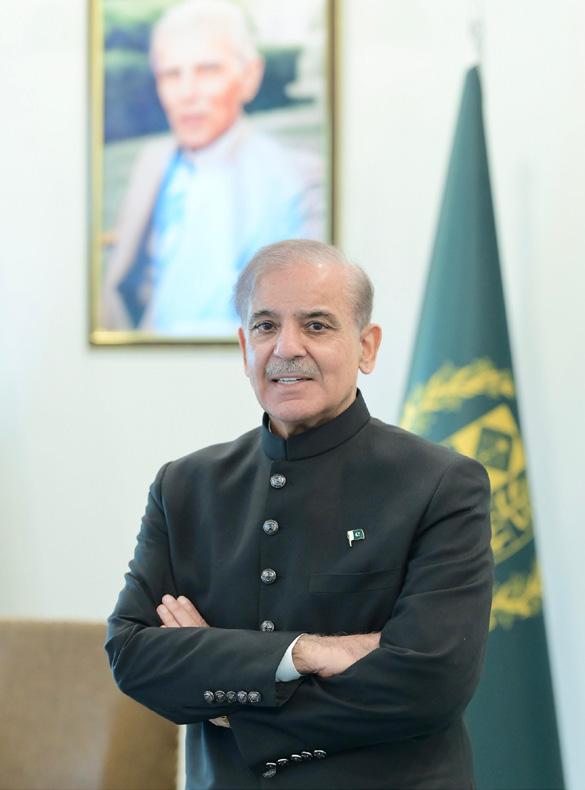
4 minute read
Reviving trade ties with India: A pragmatic move for Pakistan
From the editor’s desk
By Rabindra Mukherjee
Pakistan's foreign minister, Ishaq Dar, recently signaled a potential revival of trade ties with India, sparking discussions on the economic implications and geopolitical dynamics of such a decision. This statement comes against the backdrop of ongoing trade between the two countries through third-party channels, indicating a latent demand for direct engagement.
The economic rationale behind Pakistan's contemplation is evident. Despite strained diplomatic relations, trade between India and Pakistan persists, albeit indirectly. India has been exporting significant volumes of goods to Pakistan, including petroleum products, sugar, and pharmaceuticals, valued at approximately $1.10 billion annually. Meanwhile, Pakistan's economy is grappling with mounting external debts, dwindling reserves, and soaring inflation, necessitating urgent measures to stabilize its financial footing.
However, the prospect of renewing trade ties with India must be viewed in the broader context of regional dynamics and unresolved bilateral issues, particularly the Kashmir conflict. Pakistan's decision to sever trade relations with India following New Delhi's revocation of Article 370 and Article 35(A) in Jammu and Kashmir underscores the intricate link between economic cooperation and geopolitical disputes.
The complex and often contentious relationship between India and Pakistan serves as a defining factor in shaping bilateral trade dynamics. Despite shared historical, cultural, and economic ties, the persistent geopolitical tensions and unresolved disputes between the two nations significantly influence the trajectory of their trade relations.
Political changes, security issues, and diplomatic conflicts significantly influence the movement of goods and services between India and Pakistan. Acts of violence across borders, terrorist incidents, and military conflicts often result in interruptions to trade, prompting both countries to impose retaliatory actions and trade limitations.
Amidst the geopolitical complexities, trade initiatives often become casualties of diplomatic impasses and political posturing. The suspension of bilateral trade and transit routes following security incidents or political escalations underscores the fragility of economic ties in the face of geopolitical volatility. However, periodic efforts to revive dialogue and normalize relations offer glimpses of hope for bilateral trade prospects. Confidence-building measures, track II diplomacy, and trade facilitation initiatives serve as essential mechanisms for fostering economic engagement and mitigating the impact of political tensions on trade activities.
Prime Minister Shehbaz Sharif's insistence on addressing the Kashmir issue as a precondition for bilateral progress reflects Pakistan's entrenched stance on territorial disputes. While Pakistan seeks to advance economic interests, its position on Kashmir remains a nonnegotiable aspect of its foreign policy.
From India's perspective, the resumption of trade ties with Pakistan hinges on addressing critical concerns related to terrorism and cross-border violence. The Pulwama attack in 2019, orchestrated by Pakistanbased terror outfit Jaish-eMohammad, precipitated a significant deterioration in bilateral relations and prompted India to revoke Pakistan's 'Most Favoured Nation' status.
In light of these complex dynamics, any move towards revitalizing trade relations between India and Pakistan must be accompanied by tangible progress on the terrorism front. India's insistence on Pakistan taking decisive action against terror groups operating from its soil underscores the importance of addressing security imperatives alongside economic considerations.
As Pakistan deliberates its approach towards trade with India, it must navigate the delicate balance between economic pragmatism and geopolitical realities. While economic cooperation can potentially yield mutual benefits, it cannot come at the expense of unresolved bilateral disputes and security concerns.
The prospect of reviving trade ties between India and Pakistan represents a pragmatic step towards fostering economic prosperity and regional stability. However, it necessitates a comprehensive approach that addresses underlying grievances and security challenges. As Pakistan weighs its options, it must prioritize dialogue, cooperation, and confidencebuilding measures to chart a path towards constructive engagement with its neighbour.
In essence, the contours of IndiaPakistan relations play a pivotal role in determining the course of bilateral trade. While economic interests and commercial opportunities abound, they are intricately intertwined with broader geopolitical considerations, making the path to sustainable economic cooperation fraught with challenges yet ripe with potential for mutual benefit.









